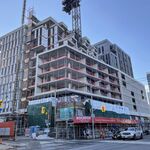Eug
Senior Member
New condo sales hit record in GTA (This is up to the end of March, not April.)
Sales in the GTA hit a record in the first quarter of 2010, according to a report by Monday.
Developers sold 5,415 new condominiums in first three months of the year, up 491 per cent or nearly six times more than the recession-impacted quarter of 2009. This represents the highest number of first quarter new unit sales on record, according to Urbanation.
Average price per square foot for all new units sold was up modestly from the fourth quarter of 2009 to $443 from $418. Unsold units on the market are asking an average of $509 per square foot.
Prices at the coveted One Bloor site, which started in the high $700-per-square foot range are now over $800 per square foot.
The sizzling sales also brought out a warning from Urbanation executive vice president Ben Myers against “irrational exuberance” among developers.
--
There were 17 new projects in the first quarter of this year, while the second quarter is forecast to see an estimated 30 projects alone.
According to Urbanation, resale condo sales were also healthy, almost doubling the figures of the first quarter of 2009.
Average resale prices were $331,000 in the first quarter of 2010, compared with $280,000 in the same quarter last year.
Sales in the GTA hit a record in the first quarter of 2010, according to a report by Monday.
Developers sold 5,415 new condominiums in first three months of the year, up 491 per cent or nearly six times more than the recession-impacted quarter of 2009. This represents the highest number of first quarter new unit sales on record, according to Urbanation.
Average price per square foot for all new units sold was up modestly from the fourth quarter of 2009 to $443 from $418. Unsold units on the market are asking an average of $509 per square foot.
Prices at the coveted One Bloor site, which started in the high $700-per-square foot range are now over $800 per square foot.
The sizzling sales also brought out a warning from Urbanation executive vice president Ben Myers against “irrational exuberance” among developers.
--
There were 17 new projects in the first quarter of this year, while the second quarter is forecast to see an estimated 30 projects alone.
According to Urbanation, resale condo sales were also healthy, almost doubling the figures of the first quarter of 2009.
Average resale prices were $331,000 in the first quarter of 2010, compared with $280,000 in the same quarter last year.




